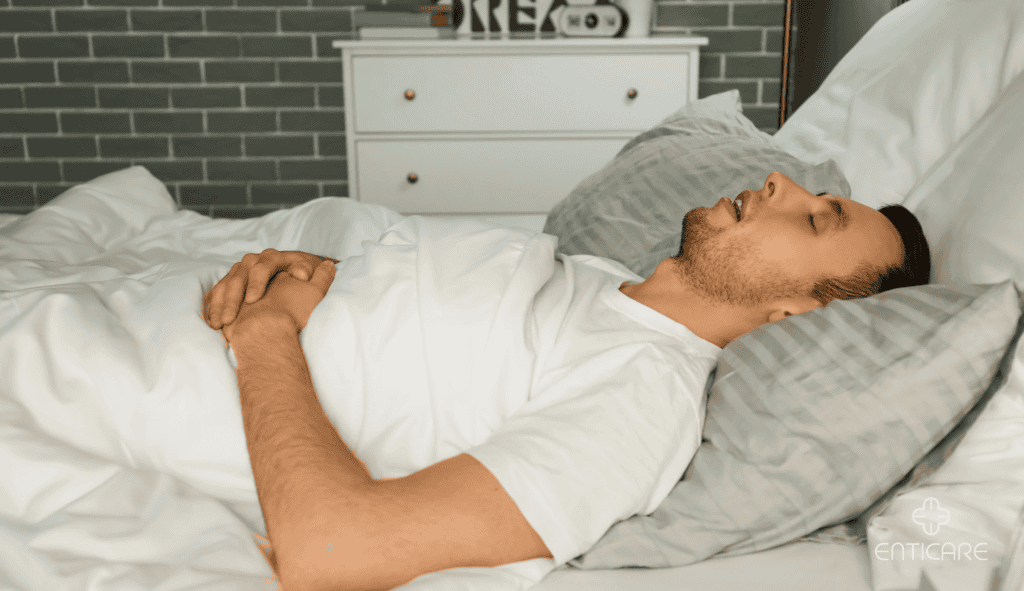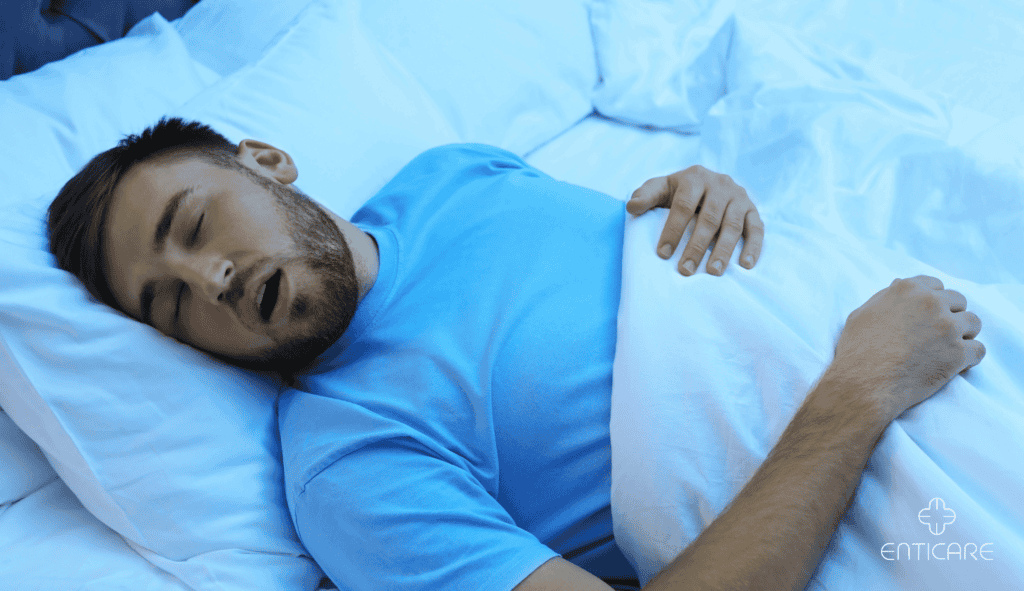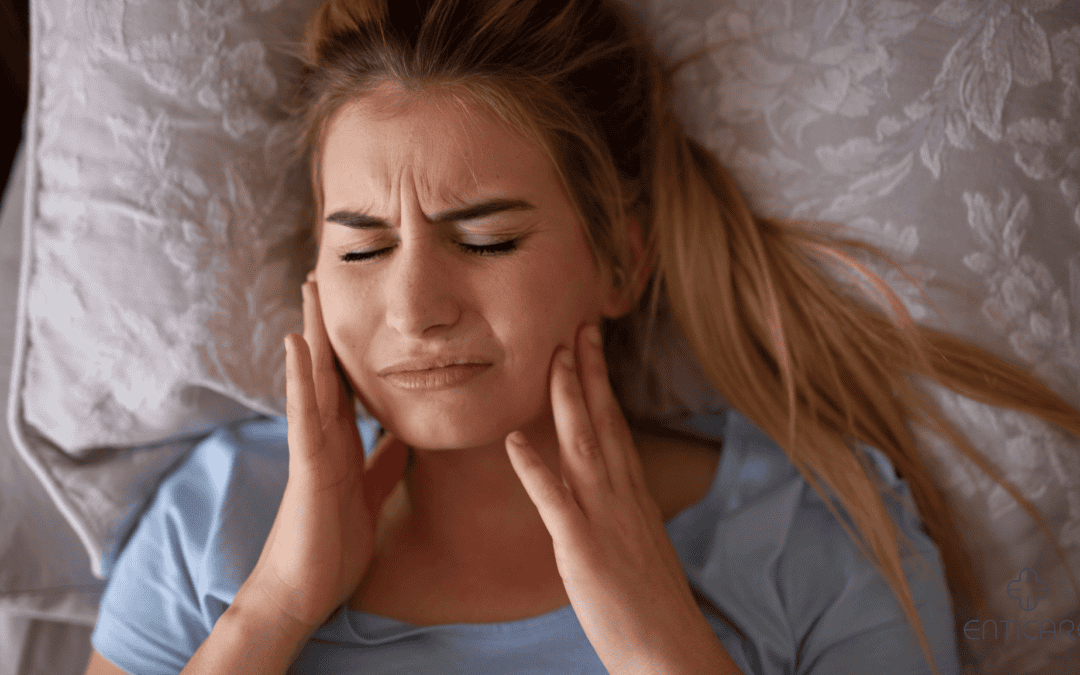Sleep is essential to your overall health, but for many people, snoring, sleep apnea, and teeth grinding disrupt rest and create lasting problems. These common sleep issues are more than just nuisances; they often indicate deeper concerns that could be affecting your well-being. Understanding the interactions between various sleep disorders, including sleep related bruxism and obstructive sleep apnea, is crucial within the field of sleep medicine.
In this blog, we’ll explore the connection between snoring, sleep apnea, and teeth grinding, why they occur, and how you can find relief. If you’re experiencing any of these symptoms, read on to learn how they may be linked and what actions you can take to improve your sleep quality.

Snoring: More Than Just a Noise
Causes of Snoring
Snoring happens when airflow through the mouth and nose becomes partially blocked during sleep. This blockage causes vibrations in the throat tissues, resulting in that familiar snoring sound. While occasional snoring may seem harmless, chronic snoring often suggests an underlying issue. Monitoring sleep respiratory events is significant in clinical assessments as they can indicate conditions like obstructive sleep apnea and impact sleep quality. Common causes of snoring include:
- Obstructed nasal airways due to allergies or sinus infections.
- Poor muscle tone in the throat and tongue, which allows them to collapse into the airway.
- Being overweight can lead to extra tissue around the neck area, narrowing the airway.
Health Impacts of Snoring
Frequent snoring may signal more than just a noisy night’s sleep. Snoring often points to conditions that affect your breathing, which, in turn, could lead to severe health problems:
- Snoring can disrupt your sleep cycles, leading to poor rest and increased fatigue.
- Chronic snoring may be a sign of sleep apnea, a serious sleep disorder that can increase the risk of heart disease, stroke, and diabetes.
- People who snore loudly may also suffer from daytime drowsiness and concentration problems, making everyday tasks more challenging.
Link Between Snoring and Sleep Apnea
Snoring and sleep apnea often coexist. While not everyone who snores has sleep apnea, many sleep apnea patients experience loud, chronic snoring. Sleep apnea occurs when the airway becomes blocked during sleep, leading to repeated interruptions in breathing. If you or someone you love snores loudly and frequently, it’s important to get evaluated for sleep apnea. Obstructive sleep apnea events can significantly impact health, correlating with conditions like bruxism and emphasizing the importance of polysomnographic findings in understanding these associations.

The Vicious Cycle: How These Sleep Issues Interact
Snoring and Bruxism: A Cause and Effect Relationship
People who snore often clench their jaw during sleep without realizing it. The vibration and blockage of the airway caused by snoring lead to restless sleep, which increases the likelihood of teeth grinding. The more severe the snoring, the higher the chance of experiencing bruxism, especially if sleep apnea plays a role.
Sleep Apnea Worsens Teeth Grinding
Sleep apnea disrupts your body’s natural sleep cycle, which can lead to more frequent teeth grinding. When your airway collapses during sleep, your body responds by tightening the jaw muscles to force the airway open. This grinding action, over time, wears down teeth and can cause significant dental damage. Additionally, sleep apnea episodes can exacerbate teeth grinding, leading to further dental issues and discomfort.
The Impact on Sleep Quality
Each of these issues – snoring, sleep apnea, and teeth grinding – disrupts your sleep cycles. You may wake up several times a night without even knowing it, which keeps your body from reaching the deep sleep stages it needs to function properly. As a result, you wake up feeling tired and irritable, no matter how long you’ve spent in bed.
Treatment Options for Better Sleep
Addressing Snoring and Sleep Apnea
Treating sleep apnea and snoring often overlaps since both issues typically involve airway obstruction, and addressing both conditions is crucial. Some of the most effective treatments include:
- Continuous positive airway pressure (CPAP) therapy keeps the airway open with a steady flow of air during sleep.
- Lifestyle changes such as weight loss, reducing alcohol intake, and sleeping on your side.
- Surgical interventions in more severe cases, like removing excess tissue or restructuring the airway.
Managing Teeth Grinding
If you struggle with teeth grinding, especially if linked to sleep apnea, a custom-made mouthguard can prevent further damage. Dentists can design night guards that protect your teeth from the harmful effects of grinding. Combining this with sleep apnea treatment often results in significant improvements. Additionally, oral appliance therapy can improve sleep quality and dental health, offering a non-invasive solution for relief and restoration of well-being.
The Importance of Seeing a Specialist
These interconnected conditions require specialized care. A sleep specialist can help you get a proper diagnosis through sleep studies and recommend the best course of treatment. A dentist can provide you with a night guard to protect your teeth and address any oral health concerns related to grinding.

Take Action for Better Sleep Today
If you’ve noticed signs of snoring, sleep apnea, or teeth grinding, don’t wait to seek treatment. These conditions can seriously affect your health and well-being if left unchecked. Schedule a consultation today with a sleep specialist who can help you get the diagnosis and treatment you need for better sleep.
To learn more or to schedule an appointment, visit Enticare’s Sleep Care.

